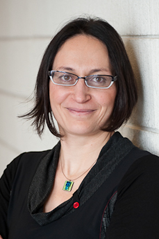- Fall Newsletter, 2025, Issue 15
- Using International Online Learning Modules to Engage Students in the Study of Critical Global Issues
- Upcoming Book Launch: Hearts of Freedom
- Announcing winners of the 2025 CARFMS Essay Contest
- The New York Declaration for Refugees and Migrants and its two Global Compacts: Addressing the Symptoms or the “Root Causes” of Forced Displacement?*
Notes from the Field: Unraveling the Intricacies of Migration with Dr. Nakache

Delphine Nakache is Associate Professor in International Development and Global Studies at the University of Ottawa. Her research focuses on refugee and immigration law, human rights, protection of migrant workers, asylum seekers and non-status migrants.
Dr. Nakache was interviewed by Zainab Abu Alrob, a first-year PhD candidate in Policy Studies at Ryerson University who focuses her research on asylum policy, resettlement and refugee integration.
In an intriguing and wide-ranging interview, Dr. Nakache unveiled meaningful and thought-provoking insight into resettlement, the treatment of refugees in Canada, human rights and policy implementation as well as the role of advocacy in academia. Nakache is a spark of inspiration for aspiring academics in the field of migration!
In the face of simplistic narratives that states need strict border policies and that asylum seekers are to be feared, Nakache nuances the explanations for spontaneous border arrivals by underlining the importance of resettlement. “Many of the asylum seekers who come spontaneously to our border, they come because resettlement is not what it should be abroad.” Nakache acknowledges both the positive contributions in Canadian refugee resettlement initiatives, and that 86% of refugees remain in the Global South. Nakache emphasizes that “resettlement is really one of the most viable options” for lifting the burden off of neighboring countries and for also reducing spontaneous border arrivals.
Nakache researches the significance of the differential treatment of asylum seekers. She refers to the “Designated Countries of Origin” and “Designated Foreign National” as measures that are “unfair” and create unnecessary hurdles for asylum seekers. “My priority for asylum seekers would be to stop having different categories of asylum seekers with different rights.” She notes that resettled refugees are deemed as legitimate while spontaneous arrivals are not. According to Nakache, the reality is much more complex than these simplistic discourses. She puts forth a compelling counter-narrative by outlining that a “small percentage of refugees are being resettled, if we were doing our job properly, we would probably have less spontaneous arrivals.”
Nakache’s interest in the gap between human rights and their implementation has led her to explore the voting rights and an “organization” of migrants. “The problem is that migrants don’t vote, so they are not politically interesting. They become an easy target because they polarize many views.” Nakache believes that after three years, every migrant should have the right to vote. This is a compelling resolution that has the power to transform the enigmatic treatment of refugees. She also outlines that “instead of fighting mobility, lets organize it…because the more you fight, the more underground migration you have.” Organizing migration relies on changing our perceptions of it. Nakache identifies the need for more studies on the benefits of immigration. Research that shows the positive impact of migrants on society both deconstructs and challenges negative discourses on migration. Making this an area worthy of further exploration for researchers!
For the academics who are passionate about shaping policy-decisions and catalyzing change, Nakache advises the production of “concrete” policy-relevant research. As a method she employs in her own work, Nakache works to reflect the views of migrants and frontline NGO workers in a language that is “clear” and policy-oriented. As an academic, “you are in a position where you are able to bring people together”. She emphasizes the “privilege of having the time to do research.” She does see roles and places in research creation for the critical thinker, those who are policy-oriented, and for the activist. “You can choose which path you want to take and how you want to take it, what makes you the most comfortable, which role you feel you are the most able to fill and do, to which is true to who you are. That’s what matters.” She urges academics to publish outside of peer-reviewed journals in order to increase access and impact: these public-facing venues are “key to having work communicated, disseminated, and to bring your work eventually to changes.”
Nakache notes that “if you continue with graduate studies, be sure it will bring you somewhere.” Pursuing graduate studies “just because, is not a good plan.” Better is to seek guidance from trusted professors and taking the time to discover an area of research that sparks passion. “The difficulty in ending undergraduate studies- for many students it is not clear what they want to do and that makes perfect sense because it takes time to know what you want to do. Don’t feel obliged to do things if you don’t want to do them.” For graduate students, Nakache outlines the importance of breaking the “isolation that comes with graduate studies.” She suggests that graduate students pursue work and research opportunities “to help you feel that you are in the right place at the right time.” For those who are looking for a rewarding and transformative graduate school experience, take the time to search within for that revelationary spark!
